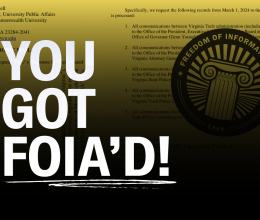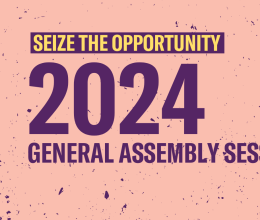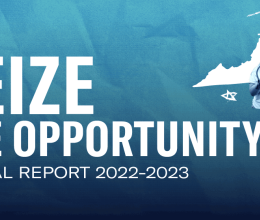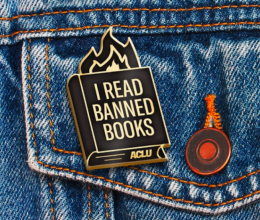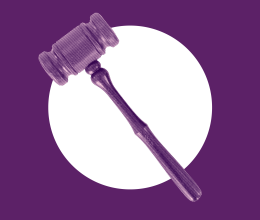
By Kent Willis, Executive Director, ACLU of Virginia
In late June, the Ninth Circuit Court of Appeals banned the Pledge of Allegiance from public schools because it contains the phrase "one nation under God." About a week later, on July 1, a new Virginia law took effect requiring all public schools to post the words "In God We Trust" in a prominent place.
At any other time, this sequence of events might have created some anxious moments in the Virginia Attorney General's office. After all, the addition of "one nation under God" to the Pledge and the establishment of "In God We Trust" as our national motto are both the result of federal laws passed in the 1950s for the purpose of officially linking our government with religion. If a federal appeals court believes it is unconstitutional to recite the former in school, it also might be unconstitutional to post the latter.
But these are not typical times. The events of September 11, 2001 made sure of that. Those terrible acts of terrorism, intended to rattle our faith in our government and ourselves, elicited instead an unprecedented outpouring of patriotism and public declarations of religious beliefs.
So it is not surprising that the initial reaction to the Ninth Circuit's decision was incredulity and outrage. People practically took to the streets. Some defiant school officials in California promised to say the pledge anyway. Churches held rallies. Politicians from one end of the political spectrum to the other lambasted it.
The next reaction, bolstered by the judge's decision to put a stay on his own ruling only a few days after issuing it, was not to take it seriously. The pundits agreed that it would probably not get past the review of the full Ninth Circuit Court of Appeals and certainly not the U.S. Supreme Court.
Now that the initial firestorm has subsided, however, many are starting to see merit in the decision, even if its timing is truly awful. If you believe that the principle of separation of church and state has been the single most important factor in the United States becoming the most religiously free nation in history, and if you believe that our government protects and serves religious diversity by being absolutely neutral on matters of faith, then this ruling makes sense.
The Supreme Court has been especially sensitive to the role of religion in public schools. And with good reason. The overwhelming majority of children in the United States attend public schools. They are young and impressionable, and they are taught to take as the truth what their teachers tell them. When they are assembled to recite "one nation under God," they are being taught a religious lesson by the government.
They are also being asked to acknowledge God in a way that may not fit squarely with their own religious beliefs. Buddhists seek a path to enlightenment that does not take the form of God in any Western sense of the word. A Muslim is more inclined to use the word Allah than God. Hinduism is a complex religion and philosophy that recognizes a supreme truth in Brahman but also acknowledges other gods
Even within the Judeo-Christian tradition, the fit is not necessarily perfect. Columnist Richard Cohen, who is Jewish, recently recalled being a student when Congress added "one nation under God" to the Pledge. He knew, even at age 12, that the religion to which Congress was referring was not his religion. Ever since then he has skipped those words when reciting the Pledge.
This brings us to Virginia's "In God We Trust" law. This bill first surfaced in the 2001 General Assembly, but failed to make it out of committee in the Senate. One year later -- but just five months after September 11-- the bill sailed through the legislature with only a small handful of opponents.
Beginning this fall, "In God We Trust" is likely to be the first and most prominent message our children see each morning when they walk through their schoolhouse doors.
How will they react? Will they think that the government is telling them they ought to trust in God, just as the General Assembly intended? If they belong to a minority faith, will they conclude that the school is teaching them to put their trust in a Supreme Being who may be different from the one their parents have taught them to believe in?
Or will they merely deduce from the posters on the wall that faith is not a profound spiritual journey on which we embark with guidance from family and religious leaders, but rather a homogenized slogan designed, packaged and disseminated by the government?
The great American experiment in religious freedom is only a little more than 200 years old, and we are still learning as we go. But we should surely know by now that when the government dictates matters of faith in the public school setting, even in the smallest and most generic way, we undermine rather than promote our objective of free exercise of religion for all.
